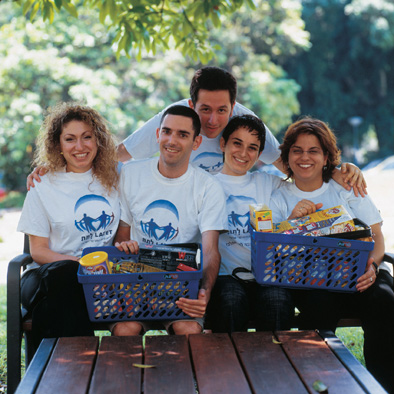
"Doing something for others makes me feel less helpless when I think of the huge problems in society that need to be solved," says Oshrat Perets, a master's student in the Weizmann Institute's Molecular Genetics Department.
This line of thought has guided her for years. Oshrat was a soldier-teacher in Beersheba and a coordinator of Perach, a countrywide "bigbrother" project initiated by the Weizmann Institute. "As a girl and a teenager I was exposed to poverty and neglect in my neighborhood in southern Tel Aviv. As a soldier I was already able to recognize hunger in children. That's what drives me now."
A few months ago, she searched the Web for a humanitarian aidorganization in which to volunteer. She found the site of Latet ("to give" in Hebrew), sent an e-mail, and was invited to participate in the campaign "Food for Life,"an effort in Tel Aviv to collect food donations for the needy.
Now, thanks to her efforts, the campaign has extended to the Rehovot area. "I involved everyone I knew, distributed flyers at the Institute, and sent e-mails to all the students. The response was great. I was surprised and encouraged to find out how many people at the Institute were already involved in contributing to society in numerous ways. We gradually evolved into a strongly bonded group of volunteers that took full responsibility for the project."
On set dates, students recruited by Oshrat stand at the entrances to local supermarkets and politely askcustomers to buy basic dry products of their choice and donate them on their way out. The products are then delivered via existing organizations catering to the elderly, new immigrants, and families severely hurt by the economic crisis.
The first time the project took place in Rehovot, the branch collected three tons of food. Since then, the students have broadened its scope to include the neighboring cities of Ness-Ziona and Rishon Le-Zion. Recently Ph.D. student Baruch Zimerman of the Institute's Molecular Cell Biology Department became responsible for organizing the campaigns in Tel Aviv and recruiting volunteers there.
Ayelet Laron, a Ph.D. student of the Molecular Cell Biology Department and one of the participants in the Rehovot project, says, "Recent publications on poverty in Israel paint a very grim picture, and I felt it was important to get involved." Shahar Molshansky, a master's student in the Biological Chemistry Department, says, "For some time I had felt the need to do something about theeconomic crisis and the generally low spirits in Israel."
Helena Medvedovsky, a master's student in the Immunology Department, immigrated to Israel from Russia nine years ago. "It hurts to see people who are hungry,"she says. "It was wonderful to see people opening up and donating, though they themselves were not necessarily well off."
"I feel much better about human nature after seeing how many people want to help others,"says Oshrat. "Something that stood out was that people tended to donate baby products, which are relatively expensive. I think the reason the Jewish people has endured is that we've always helped each other. If we lose that, we've lost everything."
